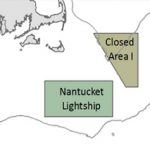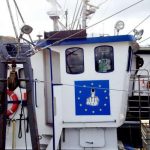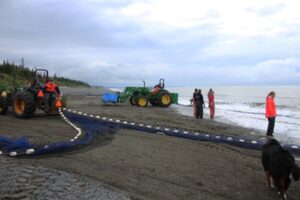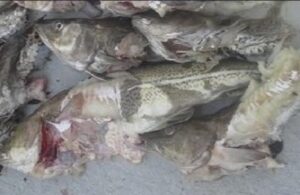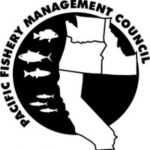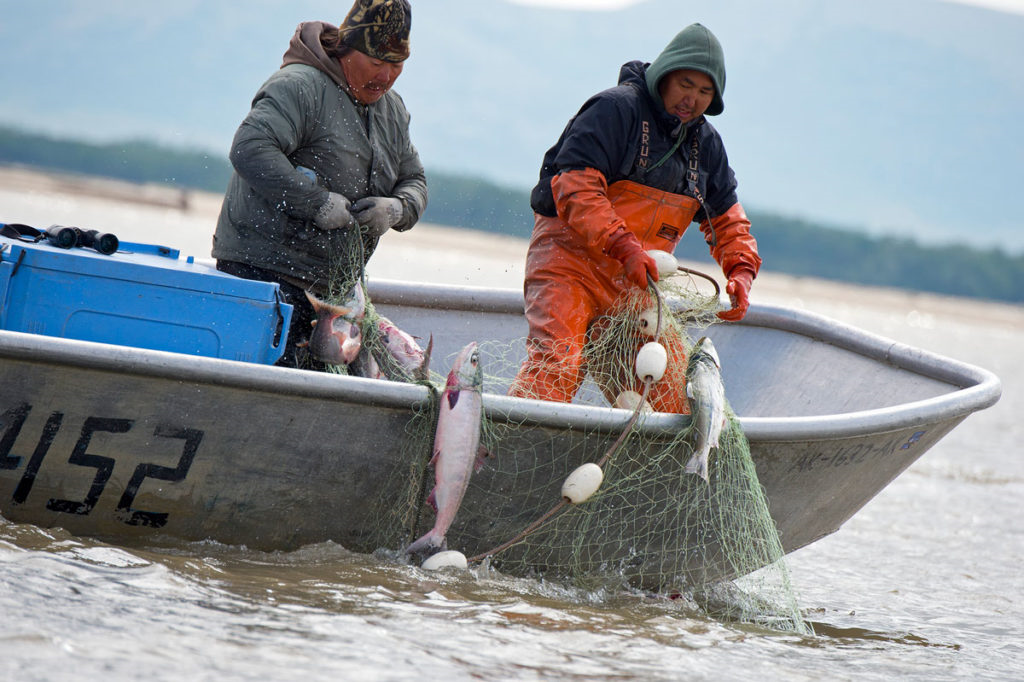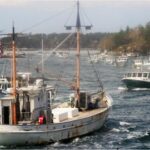Daily Archives: November 6, 2023
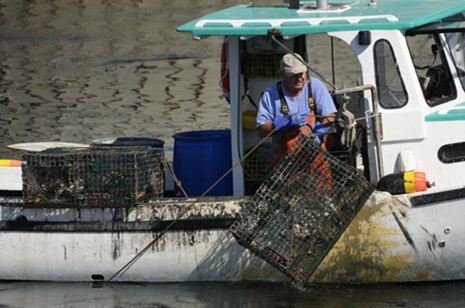
Lobstermen watching closely as federal regulators refine area for potential offshore wind
Lobster fishermen are watching closely as regulators continue to refine an area in the Gulf of Maine that could be used for offshore wind development, and they’re looking for more reassurances that the federal government will avoid popular fishing grounds. The federal Bureau of Ocean Energy Management has identified a 3.5 million acre draft area off the coasts of Maine, New Hampshire and Massachusetts that could be used for commercial offshore wind development. That proposed area excludes most of Lobster Management Area (LMA) 1, a popular offshore fishing area in Maine. But Zach Jylkka of the Bureau of Ocean Energy Management said some fishing grounds near or part of LMA 1 are still being studied and may be up for consideration, because they would be less expensive to develop. >>click to read<< 21:50
Maine: Electronic Tracking Requirements for Federally Permitted Lobster and Jonah Crab License Holders
 A Concise Summary: This rule-making incorporates the requirements in Addendum XXIX (American Lobster) and Addendum IV (Jonah crab) that were approved by the Atlantic States Marine Fisheries Commission (ASMFC) in March 2022. Specifically, for compliance with the Interstate Fisheries Management Plans, this regulation requires all federally-permitted lobster and Jonah crab license holders with commercial trap gear area permits to have approved electronic tracking devices. This requirement applies to all federally-permitted lobster and crab license holders with commercial trap gear for Lobster Conservation Management Areas (LCMAs) 1, 2, 3, 4, 5, and the Outer Cape Cod. >>click to read<< 17:49
A Concise Summary: This rule-making incorporates the requirements in Addendum XXIX (American Lobster) and Addendum IV (Jonah crab) that were approved by the Atlantic States Marine Fisheries Commission (ASMFC) in March 2022. Specifically, for compliance with the Interstate Fisheries Management Plans, this regulation requires all federally-permitted lobster and Jonah crab license holders with commercial trap gear area permits to have approved electronic tracking devices. This requirement applies to all federally-permitted lobster and crab license holders with commercial trap gear for Lobster Conservation Management Areas (LCMAs) 1, 2, 3, 4, 5, and the Outer Cape Cod. >>click to read<< 17:49
Will small boats soon have to slow down off NC to protect North Atlantic Right Whales?
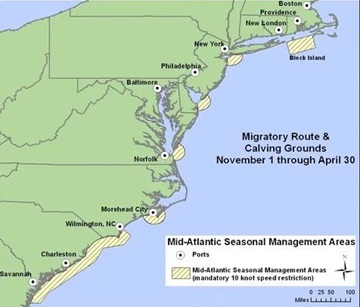 Vessel speed limits to help avoid fatal collisions between ships and one of the most endangered animals in the world that has fallen to around 350 individuals have gone back into effect off the U.S. Southeastern coast, including parts of North Carolina. The seasonal-management areas, or SMAs, limit the speed of most vessels 65 feet or longer to 10 knots, about 11.5 mph, in areas known to have heavy ship traffic that are also migratory routes or known calving grounds for the North Atlantic right whale. The go-slow zones, which run from November through April and have been in effect for more than a decade, extend about 20 nautical miles, or 23 miles, offshore and include areas around Morehead City and Beaufort and within 23 miles from shore between Wilmington and Brunswick, Ga. >>click to read<< 15:46
Vessel speed limits to help avoid fatal collisions between ships and one of the most endangered animals in the world that has fallen to around 350 individuals have gone back into effect off the U.S. Southeastern coast, including parts of North Carolina. The seasonal-management areas, or SMAs, limit the speed of most vessels 65 feet or longer to 10 knots, about 11.5 mph, in areas known to have heavy ship traffic that are also migratory routes or known calving grounds for the North Atlantic right whale. The go-slow zones, which run from November through April and have been in effect for more than a decade, extend about 20 nautical miles, or 23 miles, offshore and include areas around Morehead City and Beaufort and within 23 miles from shore between Wilmington and Brunswick, Ga. >>click to read<< 15:46
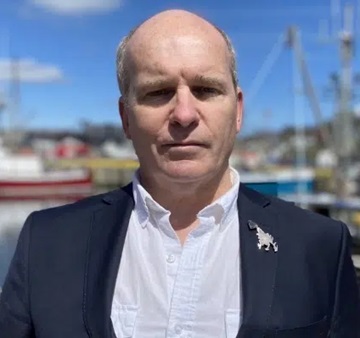
SEA-NL to Become For-Profit Fishery Co-operative
The Seaward Enterprises Association of Newfoundland and Labrador is looking to change the structure of the organization. SEA-NL has voted in favour of turning the organization into a for-profit fishery co-operative. It had previously been operating as a non-profit professional association. Executive Director Ryan Cleary says while Labrador’s industry is thriving under the co-op structure, Newfoundland’s is struggling under its current structure, so they are launching a steering committee to see what a co-op should look like on the island. >>click to read<< 11:46 >>click to read<< 11:55
Commercial Fisherman Robert Maxwell “Bob” Salter of Santa Cruz, California has passed away
 Family and friends are mourning the loss of beloved uncle and trusted friend, Bob Salter, who passed away at his Santa Cruz home with his loving family at his bedside. Bob was born in Santa Cruz to Frederick Salter and Fern Rianda Salter, he attended Delaveaga, B40, and Harbor High School. His father taught Bob the joy of fishing and love of the Sea. He grew up surfing and fishing with his brother Gary. His former boat was the Francis Jolene in the Santa Cruz Harbor. He fished for many seasons in Alaska and would visit family in Canada along the way. Bob had a lifelong career of commercial fishing and most recently fished out of Santa Cruz Harbor with Rick Ryan and his niece Bonnie Salter. >>click to read<< 10:27
Family and friends are mourning the loss of beloved uncle and trusted friend, Bob Salter, who passed away at his Santa Cruz home with his loving family at his bedside. Bob was born in Santa Cruz to Frederick Salter and Fern Rianda Salter, he attended Delaveaga, B40, and Harbor High School. His father taught Bob the joy of fishing and love of the Sea. He grew up surfing and fishing with his brother Gary. His former boat was the Francis Jolene in the Santa Cruz Harbor. He fished for many seasons in Alaska and would visit family in Canada along the way. Bob had a lifelong career of commercial fishing and most recently fished out of Santa Cruz Harbor with Rick Ryan and his niece Bonnie Salter. >>click to read<< 10:27
Norway: Cut to king crab quota recommended
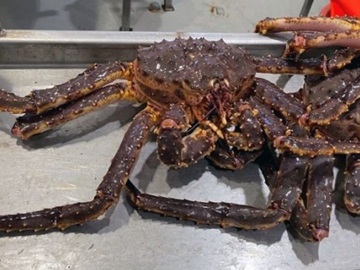 Based on the outcome of this year’s king crab survey, scientists at Norway’s Institute of Marine Research (HI) are recommending a hefty cut in the 2024 king crab quota to not more than 966 tonnes, as the survey results indicate a significant decline in the population. This means a substantial reduction compared to the quota advice for 2023, which was 2375 tonnes. ‘The result from this year’s survey shows a significant decrease in the number of crabs above the minimum target size for fisheries. The fact that we are now seeing a decline in the stock is, of course, bad news for the fishermen,’ said HI population manager for king crab, Carsten Hvingel. >>click to read<< 09:31
Based on the outcome of this year’s king crab survey, scientists at Norway’s Institute of Marine Research (HI) are recommending a hefty cut in the 2024 king crab quota to not more than 966 tonnes, as the survey results indicate a significant decline in the population. This means a substantial reduction compared to the quota advice for 2023, which was 2375 tonnes. ‘The result from this year’s survey shows a significant decrease in the number of crabs above the minimum target size for fisheries. The fact that we are now seeing a decline in the stock is, of course, bad news for the fishermen,’ said HI population manager for king crab, Carsten Hvingel. >>click to read<< 09:31
Vessel Review: Kapitan Sokolov
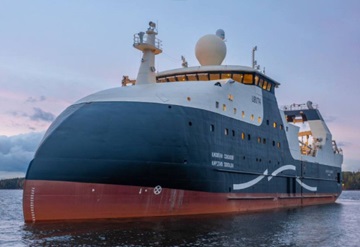 Russia’s United Shipbuilding Corporation, through its Severnaya Verf facilities in Saint Petersburg, has completed construction on a new freezer trawler ordered by local seafood company the Norebo Group. Kapitan Sokolov is the first of six Project 170701 freezer trawlers to be ordered by Norebo from Severnaya Verf. It has a steel hull, a length of 81.6 metres, a beam of 16 metres, a displacement of 5,500 tonnes, a hold capacity of nearly 1,500 tonnes of assorted fish products including fish meal and canned fish, and space for 80 crewmembers and fish processing personnel. >>click to read<< 08:34
Russia’s United Shipbuilding Corporation, through its Severnaya Verf facilities in Saint Petersburg, has completed construction on a new freezer trawler ordered by local seafood company the Norebo Group. Kapitan Sokolov is the first of six Project 170701 freezer trawlers to be ordered by Norebo from Severnaya Verf. It has a steel hull, a length of 81.6 metres, a beam of 16 metres, a displacement of 5,500 tonnes, a hold capacity of nearly 1,500 tonnes of assorted fish products including fish meal and canned fish, and space for 80 crewmembers and fish processing personnel. >>click to read<< 08:34
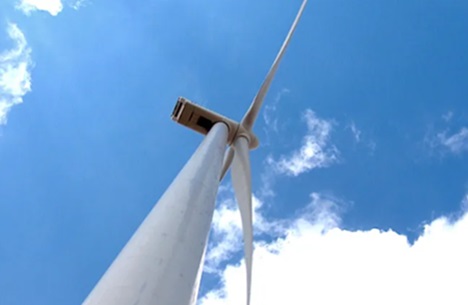
Fishermen in Maine lobbied to keep wind farms out of crucial fishing grounds. Will it happen in N.S.?
A no-compromise lobbying campaign by Maine lobster harvesters has helped keep wind farms out of a crucial lobster fishing area in the Gulf of Maine. And that has some fishermen in Nova Scotia casting an envious eye south of the border. “I’m pleased to see that happen in Maine. We’d like to see the same sort of diligence taken in Nova Scotia,” said Tommy Amirault, a fisherman from Pubnico and president of the Coldwater Lobster Association. “Maine obviously has concerns. It would be nice to 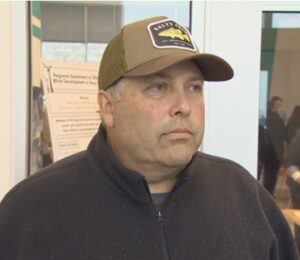 see both provincial and federal governments take our concerns into practice,” Amirault said. “We didn’t mince words that we opposed offshore wind anywhere in the Gulf of Maine. It’s one of the most productive ecosystems in the world. And we really didn’t think that this is the place to solve the renewable energy crisis,” said McCarron. In Nova Scotia, the process has just begun. He said it’s no surprise fishermen have concerns about where it happens. >>click to read<< 06:57
see both provincial and federal governments take our concerns into practice,” Amirault said. “We didn’t mince words that we opposed offshore wind anywhere in the Gulf of Maine. It’s one of the most productive ecosystems in the world. And we really didn’t think that this is the place to solve the renewable energy crisis,” said McCarron. In Nova Scotia, the process has just begun. He said it’s no surprise fishermen have concerns about where it happens. >>click to read<< 06:57




































